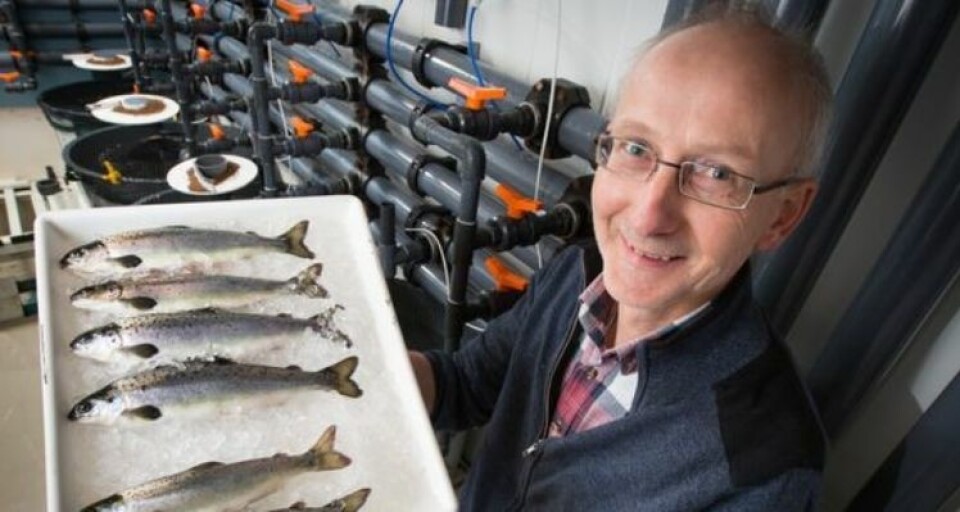
Scientists claim sterile salmon breakthrough
After ten years of research, scientists have said they've cracked the code for how breeders can produce sterile salmon. An important protein is affected during the egg stage so that salmon are not able to produce gametes (cells that enable reproduction), they reported.
In a press release, Norwegian research body Nofima said it currently had more than 2,000 sterile salmon swimming at its production facilities in Kårvika in Troms.
Senior scientist Helge Tveiten is pleased when he sees them, for the signs are that these fish are just as happy as any other salmon. Researchers have found a method that only affects the ability of fish to reproduce, and nothing else. The largest salmon at Kårvika are a year old and have grown to about 300 grammes.
Never sexually mature
"The salmon we have researched do not develop reproductive cells, and will never be sexually mature," said Tveiten. "We see a very small roe bag in female fish, but it does not form eggs. The male develops seemingly ordinary genitals, but they do not have sperm cells.".
Based on the studies made so far, the sterile fish have the same appearance and characteristics as fertile breeding salmon.
Tveiten was met with some scepticism by other parts of the industry when he first presented the idea of this sterilisation method, and Nofima has therefore used a good deal of its own funds to speed up the project.
Environmental protection
"Biologically, I knew early on that this was a viable proposition. Research done on zebrafish had identified a small number of genes that are essential for the development of gametes. Loss of one or more of these gene products resulted in a fish without sex cells, but otherwise developed normally. Similar approaches to producing sterile fish should also be possible for salmon. In practice we don't touch the genes, but affect a protein that is necessary for the fish to be able to create gametes," explained Tveiten.
There are several good reasons to create sterile farmed fish, concerning both environmental protection and animal welfare.
Better-quality meat
Making farmed salmon sterile prevents the possibility - however remote - of escaped farmed salmon crossbreeding with wild salmon and affecting wild salmon stocks, which is a concern for many. Moreover, farmers avoid the salmon reaching sexual maturity, because it then is significantly more prone to disease and has trouble maintaining salt balance in the sea.
"In addition the quality of fish meat deteriorates when the salmon reaches sexual maturity, and the product is worth less," explained Tveiten.
Upscaling is next challenge
The work of Tveiten and his colleagues has led to the creation of the SalmoSterile research project, part of the BIOTEK 2021 programme funded by the Norwegian Research Council. The project is a collaboration with the Institute of Marine Research and several key industry players, including AquaGen, which is the largest supplier of eggs to salmon industry.
SalmoSterile's goal has always been to find a harmless and unproblematic method for sterilisation of farmed fish. What now remains to be done is to make the process more efficient so that industry may eventually treat eggs on a large scale.
No desire to migrate
"We must follow this fish over a longer period, but nothing suggests that it will become sexually mature or have a need to migrate to spawn. Of course, thorough investigations must be carried out if escaped sterile salmon are attracted into the rivers. This requires more research, but as it looks now such a scenario is highly unlikely," said Tveiten.
When work on a new sterilisation method started in 2006, Tveiten and his colleagues began with cod. Eventually salmon more commercially interesting.
"The principle is the same, that is, by using this method, we can theoretically sterilise all farmed fish, regardless of species," said Tveiten.























































